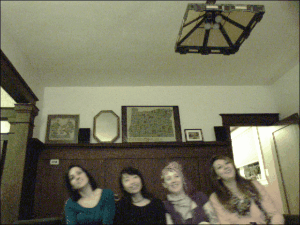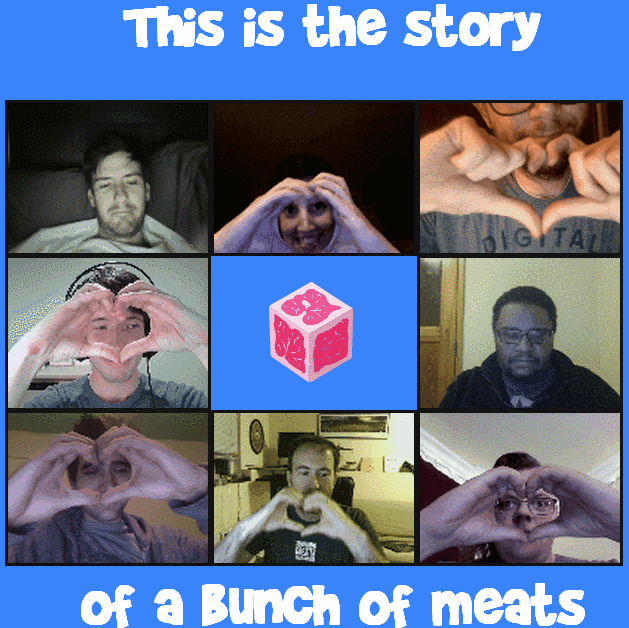When I began this blog post, I had every intention of addressing all sorts of relevant, mechanical issues relating to meatspace and ephemeral chat in general. My meatspace baptism was supposed to be the introduction to a more technical essay. Once I started writing about my experience, however, I could not stop-- all of these personal details were strewing out of me like an open fire hydrant, so I went with it.
The remarkable truth is that meatspace changed my life. Four months ago, I was in the midst of a true identity crisis--my husband had just gone back to work in an office (rather than our basement) for the first time in years, and my youngest child started full-day kindergarten. For the first time in 11 years, I was alone for hours every day, and I quickly began to feel lost and worthless.


Shortly after joining the meatspace community, I made the decision to learn programming. Now, only two months later, I am a paid freelance designer/developer-in-training with multiple part- and full-time job prospects, and I feel productive and useful and vital all the time. This experience continues to be one of the greatest challenges I have undertaken, and I am still adjusting to the constant fear of failure I deal with. The very slow process of self-teaching a new language (yes, programming languages count as actual languages) can be just as frustrating as it is rewarding.
I am fortunate to have the comfort of my endlessly supportive husband and a small group of very close sisters and friends to remind me to be patient and cheer me on. Without the encouragement from the experienced, well-respected developers I am so fortunate to call my friends on meatspace, however, I most would most certainly have given up.
Writing these confessions makes me sentimental, an emotion which some might say has no place in a discussion of the future of media, but that right there is my thesis: meatspace is a medium that causes people to feel, engage, and create community. I recognize that ephemeral chat is not for everybody, and some will never understand the appeal no matter how big gets. I am living proof, however, that this new technology is capable of impacting the lives of those who engage in it in profound ways.
My Meatspace Debut

The first time Bryce showed me meatspace, I was perplexed and unsettled-- what was this website with Hogwarts-like looping pictures of strangers talking about cats and computers and bikes and sex? I am a moderately tech-savvy person, but not an early adopter, so new technologies need to win my trust and affection over time, and meatspace was no exception.
After drilling into my kids that they must know someone "in real life" before developing an online relationship, the idea of so quickly assimilating into meatspace culture felt hypocritical. My internal Stranger Danger light started blinking furiously, and I not-so-secretly hoped that Bryce's infatuation with the chat would fade quickly. What happened instead astonished even me-- I rapidly grew to understand the purpose and benefits of meatspace, and I fell completely in love with the concept.
Meatspace and I came to an understanding the Tuesday before Thanksgiving, when my family was prepping for a trip to Portland. Amidst the chaos, Bryce and the girls were chatting with the regulars on meatspace; sharing pictures of cookies and stories about family visits, complaining about packing, and generally having a fun, silly time. I temporarily let go of my misgivings (justified by the fact that Bryce had, in fact, met many of these people in person) and joined in the party, getting to know the other meatspacers along the way.
After a couple of hours, when the bags were packed, cookies were baked, and kids were in bed, I realized that I had actually HAD FUN during what is normally a stressful chore. As a vocal member of the "The Internet is not Real Life" camp, I was surprised by the feeling that I had actually hung out with friends that evening, even though I had never met any of the meatspacers in person. The idea that I could spend time with interesting, funny people without ever leaving my house hooked me immediately.
A Change of Perspective
Until that night last November, I would not have considered chatting online "spending time" with anyone but my CPU, but meatspace changed my perception. Meatspacing is nothing like updating my status on facebook and waiting for someone to respond, even though all of my connections on Facebook are family and "real-life" friends. Despite the fact that the meatspacers started out as strangers, I quickly felt a deeper connection to the regular meatspacers than to most people I see on a daily basis.


These former strangers from Toronto and New York and San Francisco and Atlanta and Portland and even France were keeping each other company during the day while we worked or studied. They were hanging out at night, having drinks and telling amusing stories. And when someone goes out, sometimes with other meats, to a class or a conference or a party or a bar, they "mobile meatspace." When a meat is absent for too long (for some a few hours, for others a few days), we miss them and worry. Basically, we were doing in this virtual community what friends always do-- sharing our daily live with each other.
Within days, I was part of a new community that felt more like home than my actual hometown of 13 years. Within weeks, multiple in-person "meatups" were being planned across the country, and two "meatconfs"-- East Coast and West Coast USA-- are in the works for this Spring. For a while I felt almost embarrassed to admit transformation I was witnessing and experiencing, mainly because I could not articulate the details of why and how the connections had been formed.
The reason I keep coming back to meatspace is the people. So many fascinating stories and educated opinions coming from (mostly) respectful and genuinely interesting individuals of all ages from all over the world-- who wouldn't want to be a part of that exchange every day? But how had meatspace done that? How had a website facilitated the building of a community that at this point, extends far beyond the internet and into many aspects of our daily lives-- both virtually and personally? There are so many social networking option available; how did this uncomplicated chat tool trigger such rapid and profound developments in my-- and dozens of other people's-- social lives?

After reflection and discussion with various regular meatspacers, I realized that the gif is what makes meatspace feel more intimate. Seeing the person’s face, real-time, attached to the interactions, is what has allowed us to form legitimate "real life" friendships just as though we were meeting face-to-face. Surprisingly, the lack of voice seems to have helped this process, as well. No one can interrupt your thoughts, so even the typically quiet and shy person has a voice on meatspace. Plus, not hearing each other’s voices every day just amplifies the need to meet in person!
I am just as concerned as many of the critics about the future of human relationships, especially when I watch my daughters learn to appreciate the world of digital communication. Bryce and I encourage as many in-person playdates/hangouts as possible for our kids, even though it creates greater scheduling difficulties. I have wondered how we will maintain this pace when the girls are older and have more responsibilities, and worried about my girls becoming attached to their devices, communicating via 140 characters-or-less more often than not. Although our lives are busier now than they ever have been, we have not stopped craving human interaction-- we have just found ways to interact that fit into our tight schedules.
Unfortunately, the methods we have turned to that keep us "connected" thus far have been mainly frivolous and prone to unnecessary drama and conflict. While there is no substitute for a face-to-face conversation, or a good hug when you need one, there has to be a bridge between relating in-person and superficial online quipping. I believe that meatspace, and ephemeral chat in general, is that bridge.
Conscious Electronic Communication



Ephemeral chat finds "humanity in the machine," as Jonathan Harris so adeptly calls for in "Our Digital Crisis" Adding the gif to easy, quiet, familiar online chat reminds us that talking to someone face-to-face is more than just stimulating-- it satisfies our need to feel connected. It is the only digital chat tool that inspires an increase in real-life social activity.
Twitter, facebook, and other "traditional" social media allow us to be lazy; to feel a false sense of connectedness with the world; to convince ourselves that we are satisfied with electronic relationships. If we are not exposed to other people's smiles on a regular enough basis-- in person or otherwise-- we forget how special it feels to inspire one. Seeing someone laugh at a joke delights me in a way that no "LOL" on twitter ever could. Technology is going to continue to progress, and digital communication is not going anywhere. We can fight the inevitable and refuse to adapt, or we can embrace innovation and use it to improve our lives.

Multiple facets of my world have been permanently improved as a direct result of my interactions with the fantastic members of the meatspace community. I am closer with my brother than I ever have been thanks to meatspace (he is known as "physicsbro"). None of that would have happened if I not relaxed, worked through my fear of the unknown, and let myself become acquainted with meatspace.
I believe that ephemeral chat will be a critical element in the future of communication. Even if I am wrong, I know that at this moment, meatspace is amusing and educating a group of smart people all around the world, and those people are advancing and invigorating the high-tech community every day.


